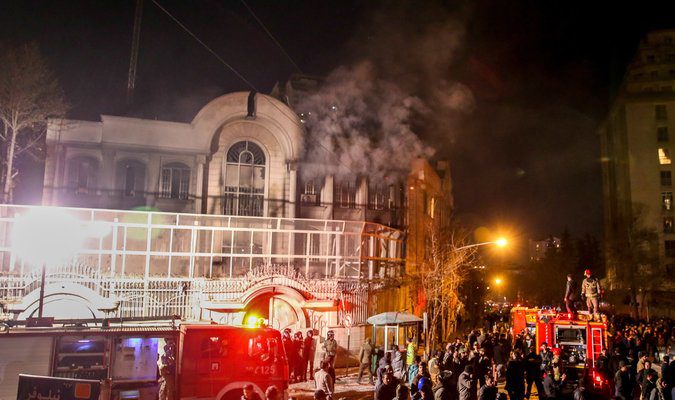Saudi Arabia has cut off diplomatic ties with regional rival Iran after demonstrators stormed the Saudi embassy in Tehran on Saturday.
On Sunday, the Saudi foreign minister Adel al-Jubeir announced that Riyadh is severing diplomatic mission with Iran following attack on its consulate. The Kingdom asked the Iranian diplomats to leave the country within 48 hours while Saudis evacuate embassy staff from Tehran.
“Saudi Arabia would not let Iran undermine its security, accusing it of having distributed weapons and planted terrorist cells in the region,” said Mr. Jubeir during a news conference. “Iran’s history is full of negative interference and hostility in Arab issues and it is always accompanied by destruction,” he added.
According to latest reports, the aircraft carrying the Saudi officials has landed in neighboring Dubai, United Arab Emirates.
“We will continue to urge leaders across the region to take affirmative steps to calm tensions,” said John Kirby, US state department spokesman. “We believe that diplomatic engagement and direct conversations remain essential.”
The demonstrations erupted nationwide as well as worldwide after Saudi Arabia’s Interior ministry announced the execution of 47 people on terrorism charges, including a Shia religious leader. Most of the men executed were Sunnis convicted of al-Qaeda linked terror attacks in Saudi Arabia between 2003 and 2006.
Saturday’s executions predominantly targeted the Saudi nationals except an Egyptian and a Chadian. Hundreds of protesters attacked the Saudi consulate in Tehran, setting fire to the building before being pushed back by police. None of the Saudi embassy staff was harmed in the incident, according to the Saudi authorities.
Iranian President Hassan Rouhani ordered the arrest and prosecution of individuals involved in the embassy attack, while condemning. The top Shia cleric Ayatollah Ali al-Sistani denounced the execution as an unjust aggression. Hassan Nasrallah, Hezbollah leader, accused the Saudi ruling family of igniting a Shia-Sunni civil war across the world.
Nimr al-Nimr, the Shia leader, was accused of inciting violence and leading anti-government protests in the eastern province of the world’s largest oil producer during the 2011 Arab Spring. The cleric was convicted of disobedience and bearing arms. IMAGE/NYTIMES

Leave a Reply